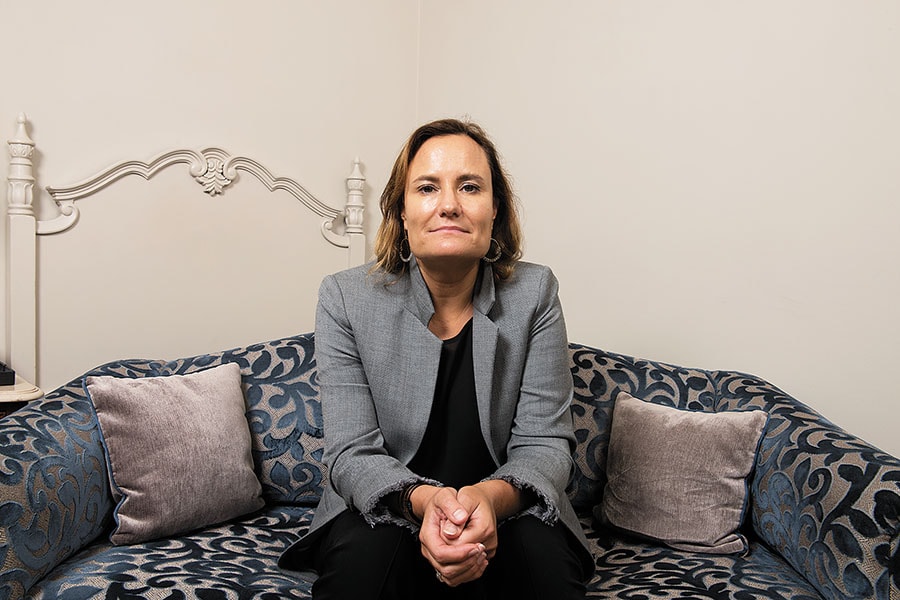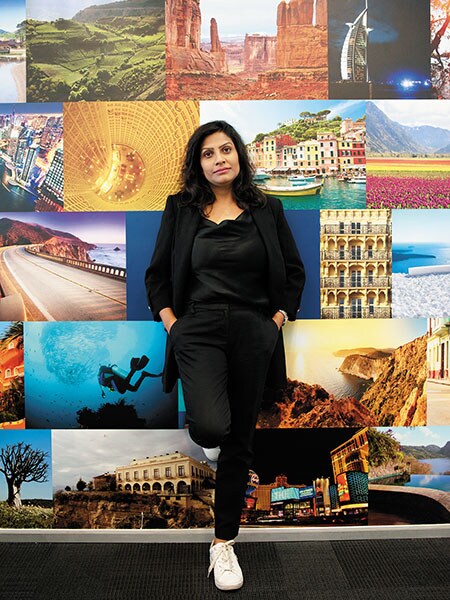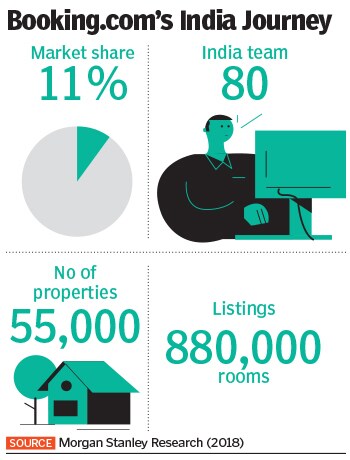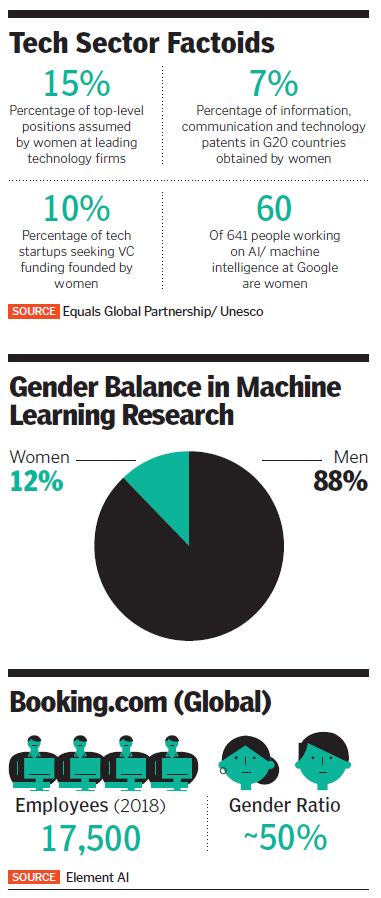Booking.com: Diversity in the age of AI
Online travel agency Booking.com has demonstrated how a digital platform can benefit from inclusivity and diversity


 Gillian Tans, chairwoman of Booking.com
Gillian Tans, chairwoman of Booking.com
Image: Amit Verma[br]The meeting with Forbes India had been scheduled in Mumbai for June 25, 2019. But Gillian Tans, then president and CEO of Booking.com, took a rain check. Within a day, Booking Holdings announced a management change: Tans was now chairwoman, and Glenn Fogel became CEO.
For three years since 2016, Tans was a hands-on outlier in the internet industry. There are hardly any women who have been CEOs of internet companies across three decades of the worldwide web. Tans led the online travel agency (OTA) headquartered in Amsterdam, and whose parent company Booking Holdings is listed on the NASDAQ. The 49-year-old Dutchwoman had begun as employee number 7 at bookings.nl in 2002, when it was a startup.
True to her word, Tans met this writer in October 2019 at the WEF India Economic Summit in New Delhi. “We have seen diversity at Booking from Day 1,” she recalls. “Because The Netherlands is a small country, we had to think cross-border very early on. So, we were dealing with different cultures, and had to work with different kinds of people in the company.”
The company has people of 140 nationalities. “Diversity was really part of the DNA of the company,” Tans says. It has evolved into several interesting statistics and actions. “We have 30 percent women in the leadership team. That’s something we have had to build over time. You can’t do that overnight.”
Sensitising AI
The theme sprung to prominence last year when Unesco published a policy paper on closing gender divides in digital skills called I’d Blush If I Could. The title is borrowed from a response given by Siri, a female voice assistant used by millions of people using Apple products, when a human would tell ‘her’, “Hey Siri, you’re a bi***.”
“While voice assistants are designed to take instructions, all voice assistants are feminine,” the Unesco paper adds. “This can lead to people wrongly assuming that only a woman must take instructions for tasks, whereas both men and women must share any role.”
The paper was accompanied by a research-based piece: The rise of Gendered AI and its Troubling Repercussions. This referenced several sources of data that reflect biases in machine learning (ML) and AI. Wired magazine reviewed the AI research pages of leading technology companies and found that only 10 to 15 percent of researchers were women. Google’s AI pages, for example, listed 641 people working on machine intelligence, with only 60 women.
“Voice assistants rely on AI, a technology term for machines and systems that learn from human behaviours, choices and biases. So every time we type something on Google or Amazon, its systems learn more about us and how we think as users. Similarly, software developers who build technologies design it based on their thoughts and assumptions,” states the Unesco paper.
As CEO, Tans didn’t need a nudge to understand this. “Most of the economic and social changes will come from technologies like AI and ML. So, if you don’t have a lot of women in developing technologies, you’ll get these biases. This is also important in terms of including multiple cultures. Technology moves very fast, so it is important to ensure culture [in a technology organisation] doesn’t get left behind,” she says.
Booking.com has 20 percent women in pure technical roles. Very early on, it had realised the dangers of bias based on language, nationality, and gender. The company developed a support chatbot, the Booking Assistant, in 2017, to answer customer queries. When it was up and running, 60 percent of customers typed in English. “If you don’t think about it, Booking Assistant will address and get responsive based on only these users, right?” Tans explains.
People building digital assistants need to be mindful of biases that creep in from societies and consumers. The danger of being completely user-led is that societal biases get into the smart and automated systems. “Consumer technologies made by male-dominated teams and companies often reflect troubling gender biases,” the Unesco paper says. “As women make up just 12 percent of AI researchers, voice assistant software applications could become gender biased.”
So the more diverse an AI or ML team, the more inclusive the technology system. Unsurprisingly, the bot product-development at Booking.com was helmed by a woman: Adrienne Marie Enggist, senior director of product development, commercial operations. Even job profiles can get inadvertently written in a way that are more relevant for men than women. “We use ML to take such biases out,” Tans says.
Actions based on data are important to see where a CEO can make improvements and changes to make the organisation more inclusive, she adds. “Often, many things happen that we don’t even see ourselves. You don’t get the mix of candidates in the first place, when you see the job profiles. Promotion processes don’t work for women... Then, it’s about development and training of women. Every year, we analyse if women are being paid on par. And it’s hard work to keep improving it.”
Inclusive Product
In India, Booking has around 10 percent market share after seven years of operations, according to Morgan Stanley Research 2018. But hotel-owners and brands love the product (a partner app) for its fairness and transparency. “They have been very easy to work with because it is a completely algorithm-driven platform,” says Vaibhav Aggarwal, founder of FabHotels.com, based in Delhi. “You have complete control over commissions, over production. The algorithm decides how properties show up, how it will get pushed on mobile.”
Sidharth Gupta, co-founder of Treebo, another budget hotel chain, concurs. “They are very technologically-driven. They are also very transparent and algorithmic by nature. There is minimal human intervention in the way booking.com works. We have had to adapt to how to sell on their platform and drive up production from that channel.”
This involves understanding the Booking Preferred Partner Programme (PPP) for hotel owners and brands. It promises greater visibility to top 30 percent of partners for a higher—but standard—commission rate. Ritu Mehrotra, country manager—India, Srilanka & Maldives at Booking.com
Ritu Mehrotra, country manager—India, Srilanka & Maldives at Booking.com
Image: Amit Verma[br]For the PPP, property owners have to meet a set of criteria to be eligible. Gupta says the Treebo team understood the parameters: Quality of pictures, content specificity and quality, pricing across various channels as per booking.com’s norms, quality of the property, and so on. After hotel owners provide these details, it’s over to the algorithm.
Ritu Mehrotra, country head of Booking for India since 2017, explains the inclusivity of the OTA platform. Booking doesn’t need to push discounts. “It’s transparent pricing. The partners [hotel brands] set the prices on our platform, as opposed to discounts provided by any online platform. This helps partners know they are in the driving seat—it is their product, and they are driving it on Booking,” she says.
The algorithm can weigh over-marketed properties against actual user reviews. This means aggressive discounts can’t help property owners beyond a point on booking.com. Its technology team is based in Amsterdam, Tel Aviv (for AI and ML), and Shanghai (dedicated for Chinese consumers).
The India office of 80 people is for business and operations. “This is only the beginning,” Tans says. “There is a lot of growth in India, but there are also lots of opportunities.” For perspective, the Booking.com team in China is nearly 800-people strong.While the platform has 880,000 listings in India from 55,000 properties, the fastest-growing segment is alternative accommodations. “Around 140,000 listings in India are purely homes, apartments and other alternative properties. This has grown 68 percent in the past two years from a supply perspective,” Tans says.
This means booking.com’s global product team has to sensitise its product for smaller partners who primarily use the partner-app on mobile. “We take diversity in any form very, very seriously,” says Mehrotra. Its partner-app and users can access the content in Hindi.
Booking provides its supply information and customer services in 43 languages. The bots speak in 12 languages! “The technology is entirely in-house to make it more contextual for people,” Mehrotra says, adding that it has been instrumental in driving inbound tourist traffic to India.
The Indian subsidiary is now working on a bouquet of partnerships with local fintech ventures in a mobile-first market. Currently, tourists who have used booking.com pay at the hotel properties.
Globally, Booking and Expedia lead the pack of OTAs. The fastest-growing OTA has been Ctrip from China, as the tourism industry now gets impacted with the novel coronavirus (nCoV) epidemic. The Sars outbreak accounted for a drop in international tourist arrivals into China of almost 9.4 million, and losses ranging between $30 billion and $50 billion. The nCoV epidemic will hurt China’s travel industry again. “But this time the impact on global OTAs could be larger because of China’s contribution to global travel and tourism,” says Satish Meena, senior forecast analyst, Forrester Research.
In 2018, China had the world’s second-biggest OTA market ($44.7 billion), compared to the US ($77.1 billion), according to PhocusWright, a travel and hospitality market research firm. China’s 27 percent growth over 2017 was more than four times that of the US.
In India, Ctrip owns almost half the stake in the largest OTA, Makemytrip. And Booking Holdings has a minority stake in Ctrip! What’s this all about?
“The power of our relationship and investment in Ctrip is that we use each other’s supply,” says Tans. Booking uses Ctrip’s supply in China, and Ctrip uses Booking’s supply for outbound travellers from China. “Ctrip has a huge Chinese user base. While Booking expands in China, we also use their inventory. Travel, by its nature, is about so many places. And if you want to serve your customers, we cannot be perfect in every geography—hence, the cooperation.”
In the local market, Tans feels hotel aggregator Oyo has brought a quality standard to India for small properties, which were very difficult to work with. It has an agreement with Booking. “Any property they bring to its portfolio is being sold on Booking globally.” Premium and high-end travellers contribute to the traction for Booking India.
Tech It Forward
One way of looking at Tans’s day-to-day operational stint at Booking is that it was sandwiched between the Sars outbreak and nCoV. Both epidemics dampened the global tourism industry. “I was in my late-20s. Geert-Jan Bruinsma, who founded bookings.nl, had been walking around with his plan. It was then a team of seven people. Then, we started growing the business. I really saw the transition of bringing this industry online, and grew with the business.”
Her three years as CEO have ushered in a lot of connects with the outside world in bridging the gender divide in technology. In India, Booking began a scholarship programme in two universities last year to provide women scholars with necessary funding to advance their education in science, technology, engineering and math.
The scholarships will be granted to 12 undergraduate and postgraduate women studying subjects that include computer and information science, engineering, technology and mathematics. The grants amount to `1.3 crore across the agreements with the Indian Institute of Science in Bengaluru, and Thapar Institute of Engineering & Technology in Patiala.
Tans also introduced the Technology Playmaker Awards in September 2017 to recognise women who use technology to transform businesses, industries, communities and society. As Tans says: “When it comes to women in technology companies, we cannot solve it just internally.”
First Published: Feb 26, 2020, 11:39
Subscribe Now
